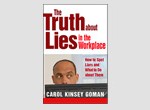 My attention was caught by a book with the title: The Truth about Lies in the Workplace: How to detect liars and what to do with them. The author is Carol Kinsey Goman, consultant and expert on body language. She uses her experience and a keen sense of observation to write an attractive and easy-to-read book. As might be expected, given the author’s profession, it is not academic, but practical. With agility she sets out various manners and situations in which some lie in business, and what can be done to detect them.
My attention was caught by a book with the title: The Truth about Lies in the Workplace: How to detect liars and what to do with them. The author is Carol Kinsey Goman, consultant and expert on body language. She uses her experience and a keen sense of observation to write an attractive and easy-to-read book. As might be expected, given the author’s profession, it is not academic, but practical. With agility she sets out various manners and situations in which some lie in business, and what can be done to detect them.
She doesn’t deal set out to assess the lie from a moral standpoint, but convincingly shows the consequences of lies for a business organization. She affirms: “Lies are not good in general, but in the workplace they are especially poisonous. They can destroy commitment and employee productivity, undermine teamwork, increase stress, ruin the livelihoods of people and even bring down entire companies. “
She expresses in specific detail the warning of medieval thinkers: that lying destroys trust, and truthfulness is fundamental to good relations both inside and outside the company. It is also in line with the Spanish adage that says “antes se coge al mentiroso que a un cojo” (It’s easier to catch a liar than a lame man).
It is true that deception and lies, as this book argues, can destroy relationships, careers and even businesses. But there’s more. By lying you degrade the word itself and betray the trust of others that you tell the truth. The first casualty of the lie is oneself: in lying you become a liar.
With the author’s permission, I would clarify the comment that “lies are not good in general“, although I can guess what she wants to express. Lies, when they are really lies, are always bad, although will play down “white lies” or even talk about “pious lies” (which, by the way, is a contradiction in terms). There’s no point in saying that they do not harm anyone, as mentioned above they do hurt at least the self, fostering an undesirable habit. Often they also harm others, and tend to produce a culture of deception. Sometimes lies are even examples of blatant injustice.
Clearly there are “useful” lies, which help one to look good, not having to give too many explanations or whatever. But even being useful doesn’t make them ethically acceptable. There are cases however when it is permissible to tell a falsehood as a legitimate defense against an unjust aggressor for proportionately serious reasons. A textbook case, in the context of World War II, was to deny that a Jew was being hidden on a visit of the Gestapo. There are no objections here. Hence the appropriate distinction is between a lie, which is when the receiver expects the truth or is entitled to accept what we say as true, and the permissible concealment of truth: there are secrets that must be kept and this is often achieved by not talking. Others may require one to mount a legitimate defense.
In most cases however, legitimate self-defense is not required because there is no unjust aggressor, therefore what is called for is the truth.
In a positive sense, and emulating the aforementioned author, we would say that the truth builds trust, strengthens relationships and creates an excellent company culture. What practical effect does this have in business management? I leave the question open. Consider the selection and promotion of personnel, internal and external corporate communications, the creation of expectations, reporting, interpersonal treatment in the daily activity …
Esta entrada también está disponible en: Spanish

